A special primary election will be held on September 13, 2016, to fill a general election ballot vacancy for Ohio’s 8th Congressional District. Democratic nominee Corey Foister withdrew from the race to pursue an out-of-state opportunity he said he couldn’t […]
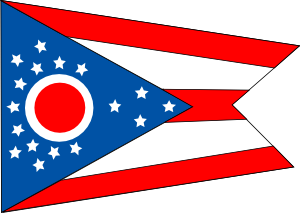 A special primary election will be held on September 13, 2016, to fill a general election ballot vacancy for Ohio’s 8th Congressional District.
A special primary election will be held on September 13, 2016, to fill a general election ballot vacancy for Ohio’s 8th Congressional District.
Democratic nominee Corey Foister withdrew from the race to pursue an out-of-state opportunity he said he couldn’t pass up.
Steven Fought, a former congressional staffer from Toledo, was the only Democrat to file for the special election ballot. In November, he will challenge recently elected Republican U.S. Rep. Warren Davidson for the seat in former House Speaker John Boehner’s district. Davidson won a June 7 special election to complete Boehner’s term and is seeking a full term in November.
July 7, 2016 •
Ohio Legislator Seeks to Eliminate Certain Special Elections
Ohio Sen. Kris Jordan recently introduced a bill to eliminate special elections in February and August. His proposal is the result of historically low voter turnout in Ohio special elections. Fewer than 10 percent of residents usually participate in any […]
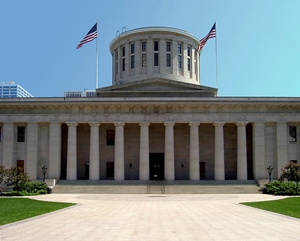 Ohio Sen. Kris Jordan recently introduced a bill to eliminate special elections in February and August.
Ohio Sen. Kris Jordan recently introduced a bill to eliminate special elections in February and August.
His proposal is the result of historically low voter turnout in Ohio special elections. Fewer than 10 percent of residents usually participate in any special election, and an election can cost the state $4 to $6 million.
June 20, 2016 •
New Ethics Rules Take Effect in Cuyahoga County
The Cuyahoga County Council recently updated the county’s code of ethics to clarify the ethical rights, responsibilities, and prohibitions applicable to elected officials, employees, board members, contractors, and lobbyists. New provisions include, but are not limited to, a new lobbyist […]
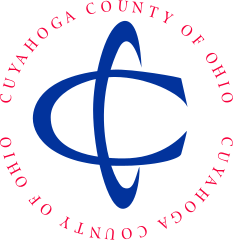 The Cuyahoga County Council recently updated the county’s code of ethics to clarify the ethical rights, responsibilities, and prohibitions applicable to elected officials, employees, board members, contractors, and lobbyists.
The Cuyahoga County Council recently updated the county’s code of ethics to clarify the ethical rights, responsibilities, and prohibitions applicable to elected officials, employees, board members, contractors, and lobbyists.
New provisions include, but are not limited to, a new lobbyist registration threshold, a new lobbyist reporting requirement, updated gift rules with a presumption of influence standard, and a lower monetary contract threshold for contractor registration and ethics training.
A summary of the changes to the ethics laws and a copy of the ordinance are available for review on the county inspector general’s website. The ordinance became effective May 27.
June 7, 2016 •
Ohio Voters to Fill Boehner’s Seat
Voters in six Ohio counties will decide today who will fill the congressional seat left vacant by former House Speaker John Boehner. Republican Warren Davidson is facing off against Democrat Corey Foister and Green Party candidate Jim Condit Jr. The […]
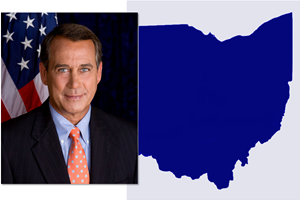 Voters in six Ohio counties will decide today who will fill the congressional seat left vacant by former House Speaker John Boehner.
Voters in six Ohio counties will decide today who will fill the congressional seat left vacant by former House Speaker John Boehner.
Republican Warren Davidson is facing off against Democrat Corey Foister and Green Party candidate Jim Condit Jr. The winner will complete Boehner’s term.
Low voter turnout is expected with no other races on the ballot.
April 18, 2016 •
State and Federal Communications Sponsors 2016 Cherry Blossom Princess for The Ohio Society of Washington, D.C.
State and Federal Communications, the sponsor of the 2016 Cherry Blossom Princess of The Ohio Society of Washington, D.C., introduced Ms. Jasmine Wyatt as this year’s Ohio winner at the National Conference of State Societies (NCSS) Cherry Blossom Premiere Event […]
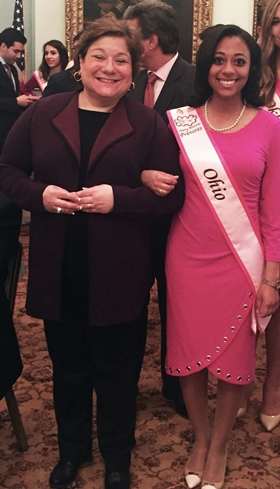 State and Federal Communications, the sponsor of the 2016 Cherry Blossom Princess of The Ohio Society of Washington, D.C., introduced Ms. Jasmine Wyatt as this year’s Ohio winner at the National Conference of State Societies (NCSS) Cherry Blossom Premiere Event in Washington, D.C. on April 11.
State and Federal Communications, the sponsor of the 2016 Cherry Blossom Princess of The Ohio Society of Washington, D.C., introduced Ms. Jasmine Wyatt as this year’s Ohio winner at the National Conference of State Societies (NCSS) Cherry Blossom Premiere Event in Washington, D.C. on April 11.
State and Federal Communications President and CEO Elizabeth Bartz honored Ms. Wyatt at a dinner event at The Army and Navy Club, along with the other winners of their respective states and territories.
Since 1948, state and territorial societies, as well as the international embassy community, have selected more than 3,000 accomplished young women for their academic achievement, exceptional poise and appearance, leadership, interest in social, civic, community and world affairs, with a strong desire to serve others through community service, maturity and responsibility to represent their respective states as “Cherry Blossom Princess.”
The week-long National Cherry Blossom Festival allows the ladies to participate in a number of activities, community service, and cultural exchange events. The week culminates by selecting one Cherry Blossom Queen, who is then invited by the Japan Cherry Blossom Association (JCBA) to visit Japan.
Ms. Bartz explains, “The Cherry Blossom Princess program is a wonderful event that State and Federal Communications is so proud to sponsor. These young women have outstanding backgrounds and have already achieved much in their early careers. Our support empowers them to fuel their dreams of future leadership positions. We look forward to Ms. Wyatt representing The Ohio Society of Washington, D.C., at many events this season.”
Ms. Wyatt is a 2011 graduate of St. Vincent-St. Mary High School in Akron, Ohio, and a 2015 graduate of Harvard University where she majored in government and minored in South Asian studies. She currently works as a Staff Assistant for Senator Richard Durbin (IL). She began her career in D.C. in 2010 as a Congressional Page. Since then, Jasmine has interned in the Akron mayor’s office, interned with the Department of State, and was the Franklin Williams Fellow-Women & Foreign Policy at the Council on Foreign Relations.
On a more personal note, Ms. Wyatt has taught English to children in local hospitals in Lima, Peru and studied abroad at the School for International Training in Geneva, Switzerland.
Ms. Bartz adds, “Jasmine is an excellent representative for the State of Ohio in the Cherry Blossom Festival. It is a special bonus that she graduated from high school in Akron, Ohio, the same city that State and Federal Communications calls our home.”
For information on the event, visit: http://www.statesocieties.org/cherry-blossom-1/
April 12, 2016 •
Ohio Lawmaker Introduces Bill to Amend Campaign Finance Law
Ohio Rep. John Becker recently introduced campaign finance legislation to simplify and modernize current state law. House Bill 502 would put an end to paper filing for local candidates and committees and phase in electronic filing over the next 3 […]
 Ohio Rep. John Becker recently introduced campaign finance legislation to simplify and modernize current state law. House Bill 502 would put an end to paper filing for local candidates and committees and phase in electronic filing over the next 3 years.
Ohio Rep. John Becker recently introduced campaign finance legislation to simplify and modernize current state law. House Bill 502 would put an end to paper filing for local candidates and committees and phase in electronic filing over the next 3 years.
County-wide candidates could begin filing electronically in 2017, school board candidates in 2018, and city and village candidates in 2019. Local filings would be submitted in the same manner as state filings on the secretary of state’s website.
Other provisions of Becker’s proposal include rounding contribution limits to the nearest $100, eliminating campaign finance filing requirements for committees and political contributing entities raising or spending less than $2,000 in a reporting period, delaying post-general campaign finance reports until the first week of January, and eliminating the itemization requirement when reporting income or expenses for a single entity totaling less than $100.
April 5, 2016 •
Proud to Be a Sponsor of Ohio Chamber of Commerce Annual Meeting
State and Federal Communications is excited to be a Bronze Sponsor of the Ohio Chamber of Commerce Annual Meeting and Legislative Reception in Columbus, Ohio on April 5, 2016! The keynote speaker for the event is former Speaker of the […]
 State and Federal Communications is excited to be a Bronze Sponsor of the Ohio Chamber of Commerce Annual Meeting and Legislative Reception in Columbus, Ohio on April 5, 2016! The keynote speaker for the event is former Speaker of the U.S. House of Representatives John Boehner.
State and Federal Communications is excited to be a Bronze Sponsor of the Ohio Chamber of Commerce Annual Meeting and Legislative Reception in Columbus, Ohio on April 5, 2016! The keynote speaker for the event is former Speaker of the U.S. House of Representatives John Boehner.
State and Federal Communications President and CEO Elizabeth Bartz and a team from the company are in attendance.
March 30, 2016 •
Columbus City Council Passes New Ethics Legislation
The Columbus City Council passed three new pieces of ethics legislation on Monday, March 28, strengthening financial disclosure provisions and amending city campaign finance and lobbying laws. Ord. 0084-2016 requires lobbyists to file updated registration statements in January, May, and […]
 The Columbus City Council passed three new pieces of ethics legislation on Monday, March 28, strengthening financial disclosure provisions and amending city campaign finance and lobbying laws.
The Columbus City Council passed three new pieces of ethics legislation on Monday, March 28, strengthening financial disclosure provisions and amending city campaign finance and lobbying laws.
Ord. 0084-2016 requires lobbyists to file updated registration statements in January, May, and September of each year. Knowingly failing to register as a lobbyist will be a third degree misdemeanor, while knowingly filing a false statement will be a misdemeanor of the first degree.
Although state campaign finance laws apply to municipal elections, Ord. 0087-2016 requires additional election period communication disclosure statements to be filed with the Franklin County Board of Elections and with the city clerk if contributions or expenditures for the reporting period equal or exceed $10,000.
Among other changes, Ord. 0086-2016 expands financial disclosure requirements for public office holders and candidates, requiring a description of each gift or aggregate of gifts over $75 from certain sources.
All three ordinances go into effect September 28, 2016.
March 21, 2016 •
Proposed State Ballot Initiative Includes Revolving Door Provision for Ohio Legislators
Attorney General Mike DeWine recently approved language for a proposed ethics amendment to the Ohio Constitution. The proposal includes a revolving door provision, including a two-year ban on former legislators doing business with the Legislature. The issue must be reviewed […]
 Attorney General Mike DeWine recently approved language for a proposed ethics amendment to the Ohio Constitution. The proposal includes a revolving door provision, including a two-year ban on former legislators doing business with the Legislature.
Attorney General Mike DeWine recently approved language for a proposed ethics amendment to the Ohio Constitution. The proposal includes a revolving door provision, including a two-year ban on former legislators doing business with the Legislature.
The issue must be reviewed by the Ohio Ballot Board to determine how it should appear on the ballot. Supporters of the amendment must gather at least 305,591 signatures of registered Ohio voters in order to reach the fall ballot.
March 2, 2016 •
Happy Birthday, Ohio!
State and Federal Communications is proud to be one of the sponsors of The Ohio Society of Washington D.C.’s 2016 Ohio Birthday Celebration! The grand event will take place tonight in the Montpelier Room of the James Madison Building at […]
 State and Federal Communications is proud to be one of the sponsors of The Ohio Society of Washington D.C.’s 2016 Ohio Birthday Celebration!
State and Federal Communications is proud to be one of the sponsors of The Ohio Society of Washington D.C.’s 2016 Ohio Birthday Celebration!
The grand event will take place tonight in the Montpelier Room of the James Madison Building at the Library of Congress.
Elizabeth Bartz, the company’s President and CEO, will be in attendance.
February 22, 2016 •
Monday News Roundup
Lobbying New Mexico: “Senators Credit KOB As They Pass Campaign Finance System Reform” by Ryan Luby for KOB Campaign Finance New Mexico: “‘Dark Money’ Disclosure Bill Dies in Final Days of Session” by Trip Jennings for New Mexico In Depth […]
Lobbying
New Mexico: “Senators Credit KOB As They Pass Campaign Finance System Reform” by Ryan Luby for KOB
Campaign Finance
New Mexico: “‘Dark Money’ Disclosure Bill Dies in Final Days of Session” by Trip Jennings for New Mexico In Depth
Washington: “State: Food industry lobby engaged in ‘egregious’ money laundering in 2013 vote” by Joel Connelly for Seattle Post-Intelligencer
Ethics
Alaska: “Former Juneau Lawmaker Fined $18K for Allegedly Helping Oil Companies While Seeking Oil Jobs” by Matt Miller for KTOO
Missouri: “Gutting of Lobbying Bill Clouds Ethics Agenda’s Future” by Kurt Erickson for St. Louis Post-Dispatch
Missouri: “Missouri Rep. Don Gosen Abruptly Resigns under Cloud of Suspicion” by Jason Hancock for Kansas City Star
New York: “Former Assemblyman Dennis Gabryszak Accused of Sexually Harassing Staffers Is Fined $100G by Legislative Ethics Commission” by Kenneth Lovett for New York Daily News
Ohio: “Ginther’s Ethics Proposals Get Public Hearing” by Mike Foley for WCBE
Texas: “Reports: Indicted Crystal City mayor jailed after disrupted council meeting” by Claire Cardona for Dallas Morning News
Virginia: “Virginia Taxpayers Pick Up $2,435 Food and Beer Bill for Mystery Guests in Redskins Suite” by Graham Moomaw for Richmond Times-Dispatch
Elections
“Fall of the House of Bush: How last name and Donald Trump doomed Jeb” by Ed O’Keefe, Dan Balz and Matea Gold for the Washington Post
“Sanders Supporters Like Chipotle, While Trump Fans Prefer Sonic” by Tim Higgins for Bloomberg.com
“Bernie’s Army of Coders” by Darren Samuelsohn for Politico
“Pope Francis Suggests Donald Trump Is ‘Not Christian’” by Jim Yardley for The New York Times
Nevada: “Hillary Clinton Beats Bernie Sanders in Nevada Caucuses” by Amy Chozick and Patrick Healy for The New York Times
South Carolina “The More Donald Trump Defies His Party, the More His Supporters Cheer” by Trip Gabriel for The New York Times
South Carolina: “Donald Trump’s South Carolina Victory Spurs New G.O.P. Jostling” by Maggie Haberman and Alan Rappeport for The New York Times
February 16, 2016 •
Tuesday Lobbying and Campaign Finance News Update
Lobbying Florida: “Lobbying firms pull in cash as year ends” by Jim Saunders in the Tallahassee Democrat Hawaii: “Lobbying Law Proposed For Kauai” by Chad Blair in the Honolulu Civil Beat Idaho: “Bill would make university, state agency lobbyists report […]
 Lobbying
Lobbying
Florida: “Lobbying firms pull in cash as year ends” by Jim Saunders in the Tallahassee Democrat
Hawaii: “Lobbying Law Proposed For Kauai” by Chad Blair in the Honolulu Civil Beat
Idaho: “Bill would make university, state agency lobbyists report their spending” by Betsy Russell in the Spokesman Review
New Hampshire: “Political Wrangling Over ‘People’s Pledge’ in New Hampshire” by Simone Pathé in Roll Call
New Mexico: “Campaign finance fix bill triggered by KOB investigation 1 step away from clearing legislature” by Ryan Luby in KOB 4
Ethics
New Mexico: “Ethics commission proposal faces scrutiny in Senate panel” by Dan Boyd in the Albuquerque Journal
Virginia: “Senators vote to undo parts of ethics reform law” by Jim Nolan in the Richmond Times-Dispatch
Elections
“DCCC Names First 16 Candidates to ‘Red to Blue’ Program” by Simone Pathé in Roll Call
Florida: “With Safe Districts Gone, Two Florida Lawmakers Taking Their Time on 2016 Decision” by Eli Yokley in Roll Call
Ohio: “Bill would ban switching political parties in Ohio primary elections” by Robert Higgs in the Plain Dealer
Procurement
Texas: “Some contractors say new Texas disclosure law confusing” by The Associated Press in KXAN
Legislative Issues
Alaska: “Longtime Alaska Lawmaker Max Gruenberg Dies” by Nathaniel Herz in Governing
Arizona: “Arizona lawmakers seek ability to more easily overturn ballot measures” by Howard Fischer in the Daily Courier
February 12, 2016 •
Public Hearing Scheduled to Discuss Changes to Columbus, OH Ethics Laws
Columbus City Council President Zach Klein will hold a public hearing on proposed ethics legislation on Wednesday, February 17, 2016. The proposed changes enhance transparency and accountability for lobbyists, strengthen ethics disclosure laws, and amend campaign finance reporting requirements. Public […]
 Columbus City Council President Zach Klein will hold a public hearing on proposed ethics legislation on Wednesday, February 17, 2016. The proposed changes enhance transparency and accountability for lobbyists, strengthen ethics disclosure laws, and amend campaign finance reporting requirements.
Columbus City Council President Zach Klein will hold a public hearing on proposed ethics legislation on Wednesday, February 17, 2016. The proposed changes enhance transparency and accountability for lobbyists, strengthen ethics disclosure laws, and amend campaign finance reporting requirements.
Public testimony will be accepted. Comments will be limited to three minutes. Those wishing to comment must fill out a speaker slip at Columbus City Hall on the day of the hearing.
February 10, 2016 •
Cleveland City Council Raises Campaign Contribution Limits for Local Candidates
Cleveland City Council voted Monday, February 8, to increase campaign contribution limits for mayoral and council candidates. After much debate, the Finance Committee agreed on a $5,000 annual limit from individuals and a $7,500 annual limit from political action committees […]
 Cleveland City Council voted Monday, February 8, to increase campaign contribution limits for mayoral and council candidates.
Cleveland City Council voted Monday, February 8, to increase campaign contribution limits for mayoral and council candidates.
After much debate, the Finance Committee agreed on a $5,000 annual limit from individuals and a $7,500 annual limit from political action committees giving to mayoral candidates. Individual contributions to council candidates were capped at $1,500 annually, with PAC contributions limited to $3,000.
The ordinance passed with three council members voting against it.
Photo of the Cleveland skyline by Eric Drost in Wikimedia Commons.
State and Federal Communications, Inc. provides research and consulting services for government relations professionals on lobbying laws, procurement lobbying laws, political contribution laws in the United States and Canada. Learn more by visiting stateandfed.com.


